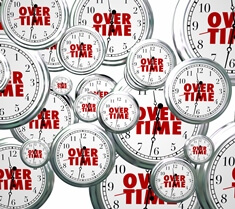Employment Law
Protecting Company Information through Non-Competition, Non-Solicitation, and Confidentiality Agreements
Companies often utilize non-competition, non-solicitation, and confidentiality agreements to maintain their competitive edge and protect confidential information. However, in October of 2018, Massachusetts passed a new law which placed requirements and restrictions on non-competition agreements. The 2018 changes only govern non-competition agreements entered into on or after October 1, 2018.
Post 2018 Non-competition agreements must comply with the following:
- They have to be in writing and signed by the employee and employer.
- The agreement has to set forth that the employee has the right to consult with an attorney prior to singing the agreement.
- Non-competition agreements must be given with the formal offer of employment or 10 business days before the employee starts working – whichever is earlier.
- If an employee signs a non-competition agreement after employment has already commenced the company has to provide “fair and reasonable consideration” (i.e., some compensation), along with 10 days’ notice before the effective date. As with non-competition agreements provided prior to employment, the agreement has to be signed and contain the provision that the employee has the right to consult with an attorney.
- The agreement cannot be broader than necessary and must be designed to protect trade secrets, confidential information, and/or goodwill of the company.
- Non-competition agreements can only last for 12 months from the last date of employment (unless exceptions exist).
- Non-competition agreements must also be limited in geographic scope.
- Non-competition agreements now must contain a garden leave clause or other “mutually-agreed upon consideration.” This means that to enforce a non-competition agreement a company needs to offer at least 50% of the employee’s highest annualized base salary for the last two years of employment on a pro-rata basis or other mutually agreed upon consideration.
- Agreements must comply with public policy.
In addition, the following types of employees cannot sign valid non-competition agreements:
- An employee who is classified as nonexempt under the FLSA or Massachusetts law;
- Graduate or undergraduate students who engage in short-term employment/internship (whether paid or not paid) while enrolled full-time or part-time in school; and
- Employees age 18 or younger.
The Massachusetts law regarding non-competition agreements governs employees who reside or are in employed in Massachusetts for at least 30 days prior to the cessation of employment.
Employers should keep in mind, however, that non-competition agreements are different from non-solicitation and non-disclosure/confidentiality agreements. Companies may still utilize non-solicitation and confidentiality agreements which prohibit employees from: (i) sharing confidential company or business information; (ii) soliciting clients, customers, or prospective customers; and (iii) soliciting employees. Unlike non-competition agreements, non-solicitation agreements and non-disclosure/confidentiality agreements do not require additional garden leave.
At the Harbor Law Group we assist companies with tailoring and reviewing non-competition, non-solicitation, and confidentiality agreements to meet their business needs.

Shehzad Rajwani
Principal Attorney
PHONE: 508-393-9244
EMAIL: srajwani@harborlaw.com
Shehzad Rajwani is an employment and business litigation attorney.
Shehzad Rajwani is an employment and business litigation attorney. His practice focuses on employment litigation in Massachusetts and federal courts as well as proceedings at the Massachusetts Commission Against Discrimination and the United States Equal Employment Opportunity Commission. Mr. Rajwani’s practice also includes representation of clients in litigation and arbitration proceedings involving partnership disputes, breaches of contract and tortious interference with contract claims and other business torts, as well as claims brought under Chapter 93A, the Massachusetts Consumer Protection Statute.
Find out more about issues in our related practice areas
Intellectual Property Law
Insights, opinions and decisions you should know about

Understanding the Massachusetts Prevailing Wage Law’s Potential Impact on Employers, Employees, and Contractors
The Massachusetts Prevailing Wage Law (“Prevailing Wage Law”) for public works projects establishes the minimum wage rates that must be paid to laborers on various public projects. Public construction projects can include, among other things, additions and alterations...

Department of Labor Raises the Salary Threshold for the Overtime Exemption
On May 18, 2016 the Department of Labor updated the salary requirements for the executive, administrative, and professional overtime exemptions under the Fair Labor Standards Act (“FLSA”). The new rule, which goes into effect on December 1, 2016, raises the...

Overtime Requirements, Independent Contractor Classification, and Safe Practices for Massachusetts Businesses
By Shehzad Rajwani and Lucia Passanisi In our practice representing both businesses and employees, we regularly see reoccurring issues when it comes to wage and hour violations. Often well-meaning employers find themselves defending a lawsuit with the potential for...

Ready, Set, Comply: The Massachusetts Earned Sick Time Law is in Effect
The Massachusetts Earned Sick Time Law, which became effective on July 1, 2015, now allows eligible employees to accrue and use sick time. What employers/employees are covered by the earned sick time law? Under this law, covered employers include individuals along...
Get in touch with us.
Learn more about how we can help.